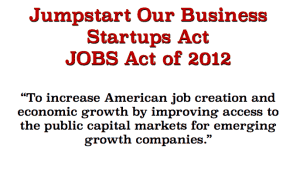 If you are an entrepreneur with an opinion on crowdfunding, please take note – Monday, February 3rd, 2014 is a very important day for you. Public comments on the proposed rules for securities crowdfunding under the Jumpstart Our Business Startups (JOBS) Act are due to the Securities Exchange Commission (SEC) on or by this coming Monday.
If you are an entrepreneur with an opinion on crowdfunding, please take note – Monday, February 3rd, 2014 is a very important day for you. Public comments on the proposed rules for securities crowdfunding under the Jumpstart Our Business Startups (JOBS) Act are due to the Securities Exchange Commission (SEC) on or by this coming Monday.
While much has been heard from professionals, from attorneys to CPAs to broker dealers, entrepreneurs (also issuers per the legislation) have been rather silent. Since we are the ones who are the most impacted by the crowdfunding rules, it is imperative we take note of this day and act!
There is a tension between improving access to capital for issuers (businesses or entrepreneurs) and protecting investors. It is a fine line between making crowdfunding easy and gathering enough information from issuers, and having investors make informed decisions on quality, comparable information.
One challenge is finding the time to plow through the proposed rules document. At 585 pages, there are almost 300 questions posed by the SEC. However, if we focus on only the proposed rules for issuers, we reduce that to about 20 pages of proposed regulations (p. 470 to 491). Discussions and questions are about 85 pages (p. 40 to 125).
The SEC posed excellent questions around all aspects of the JOBS Act. It is open to debate whether changes will be made to either the Act as a whole or simply to the rules of crowdfunding, but without comments from entrepreneurs the SEC will not have our input and thus no catalyst for change. Below is a list of a couple of areas we believe are important for entrepreneurs to provide comment (please note that when providing comment in disagreement with the draft of a proposed rule, alternatives must be provided):
 Financial Statements & Disclosure
Financial Statements & Disclosure
Accounting method
There has been much discussion and debate around the recommended use of Generally Accepted Accounting Principles (GAAP). For many startups this means using cash versus accrual-based accounting because, as the SEC noted, many early stage companies will not have the complexity requiring additional work to adhere to GAAP. Using a well-known comparable standard will allow companies to scale up using the GAAP standards. However, hiring a bookkeeper or accountant will be necessary for many who are not familiar with accrual accounting.
Review/Audit
An audit is a serious cost both in terms of internal preparation and external payments to a licensed CPA firm, which cannot be the same firm that prepared your financial statements. That said, the review is a lesser engagement than an audit, but still costly – rules require a review if raising over $100,000 and an audit if raising over $500,000. The biggest hurdle for startups will be paying for this before the money is raised. I might suggest tying audit or review requirements to the size of a company; perhaps for startups it makes more sense with capital raised to date. Remember the SEC wishes comments and alternatives.
Ongoing Reporting
Concern has been raised about the ongoing nature of audits as outlined above in addition to the annual reporting burden placed on small issuers. Aside from the cost of preparing annual audits or reviews, publishing an annual report may be onerous for companies with limited resources. Annual reporting should perhaps be by amount raised or size of company.
Using a new Form C on the existing reporting system EDGAR rather than creating another method makes sense for the SEC but could also pose some challenges for small businesses unfamiliar with the system. However, a new system would pose the same challenges.
An important warning: anyone posting information on EDGAR needs to understand this is full and complete public disclosure. In other words, anything you may wish to keep secret should not be included in the upload or reporting.
Education
 The rules call for education for the investors, a good requirement in my eyes, but there should also be education for the issuers. In addition to the issues reviewed thus far, there are valuations, risk legend disclosures, and other technical challenges for small businesses that wish to take advantage of this new fundraising mechanism.
The rules call for education for the investors, a good requirement in my eyes, but there should also be education for the issuers. In addition to the issues reviewed thus far, there are valuations, risk legend disclosures, and other technical challenges for small businesses that wish to take advantage of this new fundraising mechanism.
Whether you agree or disagree with the above, please take the time to submit a letter on or before February 3, 2014. The full version of the rules is available here. Comments can be emailed to rule-comments@sec.gov with S7-09-13 in the subject line. You may also submit online with this link.
(Disclaimer: Nothing in this article is legal advice. All securities, intellectual property, and other legal decisions should be made in consultation with a licensed attorney.)
______________________________________
 Mary Juetten is founder & CEO of Traklight.com, a Phoenix-based, software company that provides cost-effective, online IP identification tools and resources that enable inventors, creators, entrepreneurs and small businesses to identify and protect their IP. Mary consults and mentors start-ups in the areas of planning, business models, and IP identification and is active in national crowdfunding organizations CFPA and CfiRA. You can find her on LinkedIn or Twitter.
Mary Juetten is founder & CEO of Traklight.com, a Phoenix-based, software company that provides cost-effective, online IP identification tools and resources that enable inventors, creators, entrepreneurs and small businesses to identify and protect their IP. Mary consults and mentors start-ups in the areas of planning, business models, and IP identification and is active in national crowdfunding organizations CFPA and CfiRA. You can find her on LinkedIn or Twitter.



